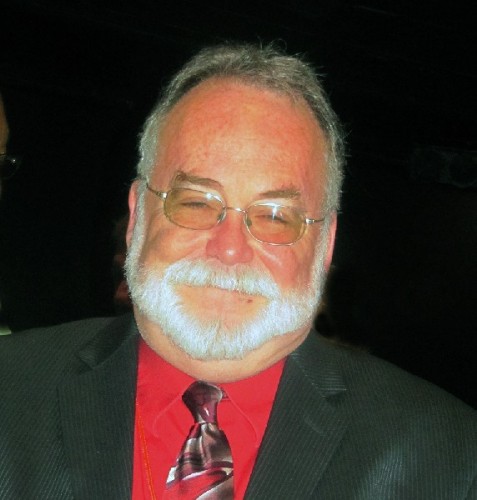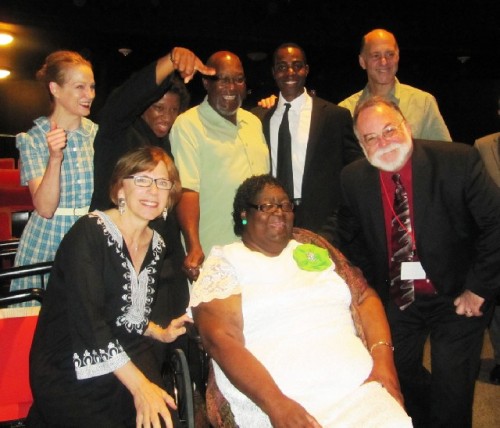Mark St. Germain Four
On Not Reading His Reviews
By: Charles Giuliano - Aug 22, 2011
During dialolgues with theatre people it is usual to learn that they do not read reviews of their work. Or if they do well after a production has closed. We asked the playwright Mark St. Germain about that and found a rational and compelling response. While his play The Best of Enemies, which returns to Barrington Stage Company from October 6 to 16, got rave reviews he indicated knowing of them indirectly.
Charles Giuliano Do you read reviews?
Mark St. Germain No. I get a sense of it by what other people will say. In this one (The Best of Enemies) I was caught off guard. Chris Innvar who was the associate director went off to take a part in Porgy and Bess (at American Repertory Theatre). It’s the pre Broadway run. He wrote me an e mail. I thought it was a personal e mail from Chris. It had all these quotes. So I saw some of them and was kind of blown away by them. I just scrolled through to the end and wrote him back. If you’re going to believe the good reviews you have to believe the bad reviews. If somebody says something really interesting, that’s constructive, I’ll hear about it. If you write something that nobody likes I’m more curious then to see the reviews.
CG You kind of make me feel bad. We work hard.
MSG I know you do.
CG We hear that all the time. Either that actors and directors don’t read the reviews or that they will read them well after the production.
MSG I think a lot of people aren’t telling the truth about that.
CG What is the reasoning? Do you try to avoid being influenced?
MSG That’s a good question. Like I said, if the reviews are bad I will want to see why they’re bad. I want to see what people didn’t like. If they’re good, you can’t avoid it. People will come to you and say so and so said this and it’s great. I kind of feel that’s appreciation. Which is great. But then I would get a big head or something. I used to read reviews early on and I read some devastating reviews. I remember a John Simon review and this goes back to a musical we did with Julie. He wrote “the book winks sluttishly at the audience.” I was devastated. Then Freud comes out and Henry and Tom and he’s writing great reviews. And I think, this is the guy who said I wink sluttishly at the audience. It’s great that he likes it but does that mean he was right the first time? That’s what I mean. If he had written a bad review of Freud I probably would have wanted to read it.
CG Can we discuss the difference between reviews and critical analysis. It is not interesting to read a plot summary and thumbs up or thumbs down. We have here a situation of regional theatre with a community of local critics. Now and then there is a show like Three Hotels at Williamstown Theatre Festival. It was a show I didn’t particularly care for. Then Ben Brantley of the New York Times comes and writes an in depth review seeing things that perhaps I and others do not see. You kind of feel that you are taken to school.
MSG Why do you think that Ben Brantley knows more than you do?
CG Because he does.
MSG I don’t know if I agree with that.
CG Ok. But it’s a kind of gold standard. The Times and Wall Street Journal. Those are the benchmarks.
MSG Alright take the Journal and take the Times. I know that with the Freud reviews in New York the Times was so so about it.
CG Who reviewed it?
MSG I don’t know. I don’t read them. But I can see when they put an ad up what the quote is. The Wall Street Journal which reviewed a production in Florida raved about Freud. So then, if they’re the gold standard, who’s right? Are you going to believe the Wall Street Journal or are you going to believe The Times?
CG Do you read any criticism?
MSG I actually like to read criticism. I loved to read Walter Kerr’s books or Eric Bentley. You’re more interested, it seems to me, in theatre in the process and people. Than writing a review. Or just as interested. I don’t see many people who do that.
CG I came to covering theatre rather late in life. My training is in art history so I am an art critic. In an earlier phase I wrote about jazz and rock. So coming to theatre I feel that I am playing catch-up. Just to be here with you, for example, is graduate school. It is amazing to be able to sit down with individuals such as yourself and engage in a dialogue. I know more about playwriting today than I did yesterday. It is also an opportunity for you to discuss and market your play.
MSG I heard good things about you. I said to Charlie (Siedenburg the PR person for Barrington Stage) we’re kind of done at this point. (Day of the last summer performance of The Best of Enemies) Charlie and a couple of people said no you really have to meet him. So you have a reputation.
CG Did I live up to it?
MSG Yes. I don’t want to denigrate anybody. But this is a conversation. It is not an interview. What you have been doing with John Douglas Thompson is creating a portrait. I have no doubt that he is one of the great actors of our time and this has historic importance. I don’t see anybody else doing that. Ben Brantley isn’t doing it. Mel Gussow actually used to do it. He would have conversations and relationships with people and then write about them. Later. In books. Walter Kerr, I don’t think he ever got personally involved. He was certainly incredibly insightful whether you agreed with him or not. So I think what you are doing is important.
CG There is also risk taking. There is exposure and vulnerability. You don’t come in with notes, prepared questions or a script. It’s a dialogue. If you don’t cut it you can get blown away.
MSG You’re very open and you do put yourself on the line. Like I would with a play. Or an actor with a performance.
CG You could shut me down in a minute. This guy doesn’t know me or my work. He’s an idiot. Why should I talk to him?
MSG Interviews can be very superficial. Especially when in the first couple of minutes you are being asked superficial questions. I try to be polite and give people what they want. We’ve been talking for an hour. I don’t know how many interviews I’ve had that went on for more than twenty minutes to a half hour.
CG It will be a lot of work to transcribe. I used to do interviews in which I took notes. So a lot of detail was lost. This is a Q&A and the entire dialogue is published. When you are in mid season and very busy most of the time critics and reporters are just looking to grab a few quotes. It was John who pushed me into taping and transcribing. He was often annoyed with what he thought were misquotes. So after writing a text we would be on the phone fixing it. To avoid that it just made sense to make the commitment to this longer process. It entails probing, asking tough questions, and then accurately quoting people.
MSG How much of what you publish is going to have you in it?
CG In what sense?
MSG You say that you’re recording questions and answers but are you going to put in some of your thoughts?
CG No.
MSG Well, you should.
CG Such as? Asides?
MSG No. If you were reproducing dialogue you have asked and said a lot of interesting things. So I would be curious to read something that had that. Not that you wouldn’t edit the hell out of it. You’d have to. The difference between straight reviews. I don’t know if you would want to put this in, but, for example, the criticism of Three Hotels. Would you put in that you were pulled up short by the Times review?
CG It’s all a part of the learning process. For example, who gives you feedback that you listen to? When you write a play you talk to Julie Boyd. Is she a primary source?
MSG There are probably about five sources of people I will go to. My wife. Which is good. Early on she would tell me “Put this in the drawer and never let it out.” I would be furious for two days. She was right. Now sometimes she will not like a play and still it will turn out well. Julie. Carolyn Rossi Copland. There’s a playwright Laura Shaine Cunningham (The Midnight Diary of Zoya Blume - Sleeping Arrangements - Dreams of Rescue - Beautiful Bodies - A Place in the Country). I really admire her. She does memoir books and plays. When I have a reading. Which would be a private reading. I would invite different friends and writers I respect.
CG We are running out of time. I want to ask about Mrs. Lincoln’s Séance. You are doing a reading which unfortunately we have a conflict with. Are you hoping to produce it here?
MSG I don’t know. It’s in a really early state. I had one private reading as I said. I wasn’t happy with it. I tried to go back and rework it. Which I’m still doing. Then we’ll see. It’s different from what I usually do. It’s more of a thriller than anything else.
CG How far down the line are you thinking? I love the idea of the split day. Writing in the morning and researching in the afternoon. When you are cooked after writing you don’t have to be so sharp to read. It’s input rather than output. You have one play in the works and one in development. How far ahead of yourself are you? Are you ever going to catch up?
MSG No. With Freud and maybe Camping With Henry and Tom and, hopefully, with Best of Enemies, if I die tomorrow there will be something there. I have a big table at home which is just stacks of different books. Projects I would love to pursue. Sometimes, there’s one I’ve been at for two years, just trying to find an angle into it. I haven’t found it yet and I know it would be interesting.
CG What does it mean to you to be a living playwright? So many of the theatre companies and Broadway are focused on revivals. There seems to be so few opportunities to experience new works in all of the performing arts. Too often the new work is confined to the format of a festival, a few days, or a week. Given all of the challenges we have discussed what does it mean to be working with a company like Barrington Stage that is producing your new works?
MSG It means the frustrations that you just said about the constant revivals. They’re safe. I don’t understand the mentality of people not developing new work. They are in the cycle all the time of constantly repeating themselves. I think a theatre company owes it to their audience to always be developing new writers. Where I am now I am in one of the luckiest seats in the world. I’m associated with a theatre that likes my work. What playwright in the country wouldn’t love that situation?
CG You have a seat at the table. Also Julianne is smart. She opens a season with a Guys and Dolls (next June, Fiddler on the Roof). Did you see Zero Hour? (On the small stage prior to Guys and Dolls.)
MSG I saw it in NY.
CG Isn’t that amazing?
MSG Yeah.
CG I think Barrington has had a greatseason so far. Julie is presenting audiences with a balanced program. Giving them what they want to see with revivals of musicals as well as new theatre. The way that she has developed you is brilliant. Nobody knew that Freud would knock it out of the park. But you were in the pipeline. Now Enemies is a hit on the Main Stage.
MSG It’s great. But I don’t think the next thing I do might be on the Main Stage. I would be perfectly happy to do it on Stage Two. I love Stage Two. There is a wonderful joy of belonging to a theatre family. Which this really is.
CG Isn’t that how Shakespeare did it?
MSG Of course. Whatever I write right now Julie will at least read it. I’m not saying she would do it. But she would read it and take it seriously. Who could ask for more than that?
Review of The Best of Enemies
NY Times on the Impact of Bad Reviews
Rececca West on Harsh Criticism



